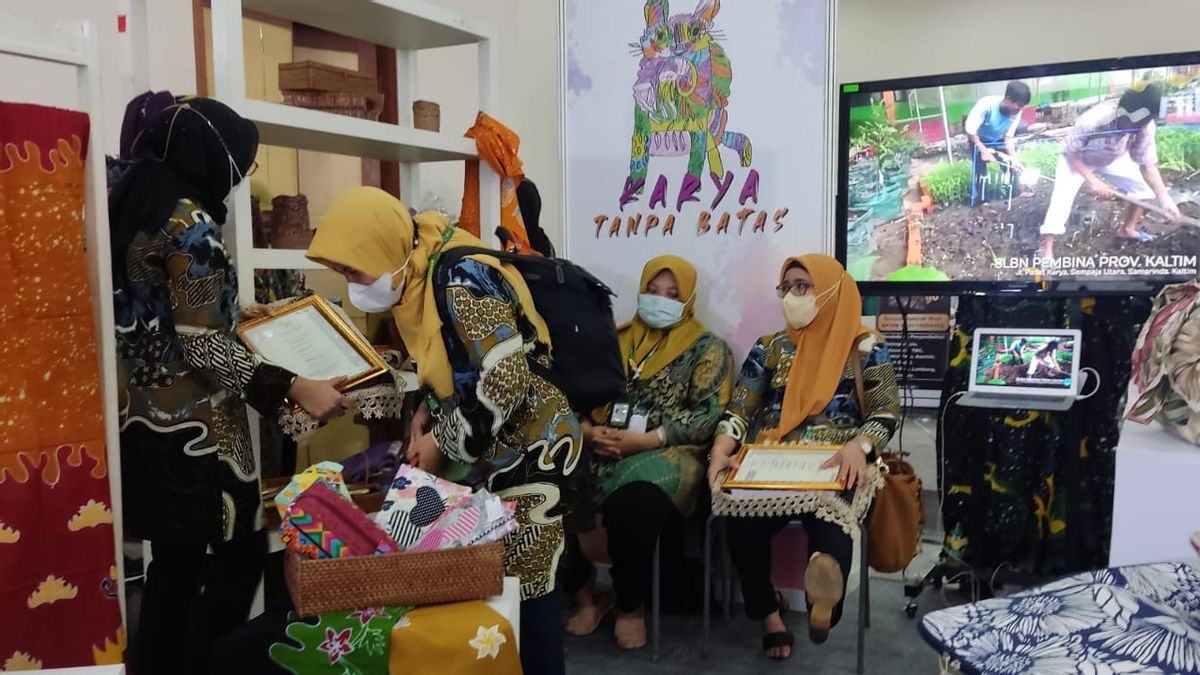JAKARTA - The Ministry of Cooperatives and SMEs (KemenkopUKM) submitted a decree (SK) on the establishment of the Indonesian Resilient Marketing Cooperative, the first disability cooperative in Indonesia, at the peak of the Unbounded Work exhibition, which is a series of commemorations of the International Day of Persons with Disabilities.
The Unbounded Work Exhibition is held as an initiative of the Solidarity Organization for the Advanced Indonesia Cabinet Era (OASE-KIM) in collaboration with the Ministry of Cooperatives and SMEs, the Ministry of Education, Culture, Research and Technology (Kemendikbudristek), and the Indonesian Independent Women's Foundation (PTI), as part of the commemoration of the International Day of Persons with Disabilities which falls on December 3 every year.
At the peak of the Unbounded Work event held at the Smesco Exhibition Hall on Tuesday, December 20, 2022, KemenkopUKM handed over the decree on the establishment of the Indonesian Resilient Marketing Cooperative, as a disability cooperative and a decree on the establishment of an Incubator Institution under the name Indonesia's Entrepreneurs with Disabilities.
Minister of Cooperatives and SMEs Teten Masduki said the submission of the Decree of the Indonesian Resilient Marketing Cooperative and the Indonesian Disability Entrepreneurship SK was a real step and support for the Ministry of Cooperatives to provide supporting facilities for people with disabilities to participate in the economy.
"With the establishment of cooperatives and incubation institutions, we are targeting that next year there will be 50 new companies or entrepreneurs from people with disabilities, which can be competitive and have sustainability," he said, Tuesday, December 20.
Teten explained that the KemenkopUKM also has plans to cooperate with the Ministry of Education and Culture in revitalizing the function of the Extraordinary School (SLB). The hope is that in the future SLB can become small incubators in building entrepreneurship for SLB students. It is hoped that the skills possessed by these SLB students can be their basic capital to build entrepreneurship.
In addition, entrepreneurs with disabilities through cooperatives can also facilitate funding through the Revolving Fund Distribution Institution (LPDB) owned by the Ministry of Cooperatives and funding support from the banking sector, to develop their business.
"I believe this supporting system is needed by people with disabilities, so that they are able to increase their participation in the economy," he added.
Suzana Teten Masduki, representing OASE-KIM, added that the No-Border Work EVENt is expected to be an annual event in December and also not just to celebrate international disability day.
"The event is expected to be able to encourage and continue to monitor the increase in the participation of people with disabilities in Indonesia and to show people with disabilities that the country is with them," added Suzanna.
Chairman of the Indonesian Tangguh Women's Foundation, Myra Winarko, emphasized that in the development and progress of a country, no community group should be left behind, especially those who have been limited to economic access, persons with disabilities and women who live with disabilities.
"We believe this movement will make our society more emancipatory. Furthermore, we also believe that advancing people with disabilities is not a simple job, and cannot be completely left to the government. Therefore, from the start our movement has always involved various companies that are contributive and have the same view as us or encourage public private partnerships," he said.
Referring to the 2020 SUSENAS data, the number of people with Indonesian disabilities reached 28.05 million people, and 22 percent of them were in the productive age group. Although access and education affordability for people with disabilities continues to increase, until 2020, only 72 percent of people with disabilities work in the informal sector (Social Welfare Index 2020).
In fact, the development of disability labor in the informal sector is one of the inclusive economic visions.
This profile describes the high potential for persons with disabilities as entrepreneurs, consumers, and professional workers. It can be assumed that increasing access and opportunities for people with disabilities in the entrepreneurial ecosystem, both at the global and national levels, will have a significant impact on productivity and the national economy.
The English, Chinese, Japanese, Arabic, and French versions are automatically generated by the AI. So there may still be inaccuracies in translating, please always see Indonesian as our main language. (system supported by DigitalSiber.id)








